EST504 Report: Digital Technologies in Education - Practices & Impact
VerifiedAdded on 2023/04/23
|20
|5792
|447
Report
AI Summary
This report provides a comprehensive overview of digital technology in education (DTC), focusing on its contextual, dynamic, and multi-dimensional applications in teaching. It explores various DTC methodologies, drawing from the experiences of teaching experts and school leaders, and builds upon teachers' perspectives regarding digital technologies and their compatibility with individual teaching and learning beliefs. The report addresses the impacts, challenges, and necessity of digital technologies in education, highlighting the link between teachers' knowledge, digital technologies, and teaching pedagogies with reference to important frameworks. It covers key terminologies, transformative activities integrating 21st-century skills, and offers recommendations for a smarter future, emphasizing the importance and implications of digital technologies in global education. The report also includes a discussion on intelligent tutoring, personalized learning, gamification, virtual and augmented reality, open resources, online programs, and digital learning texts.
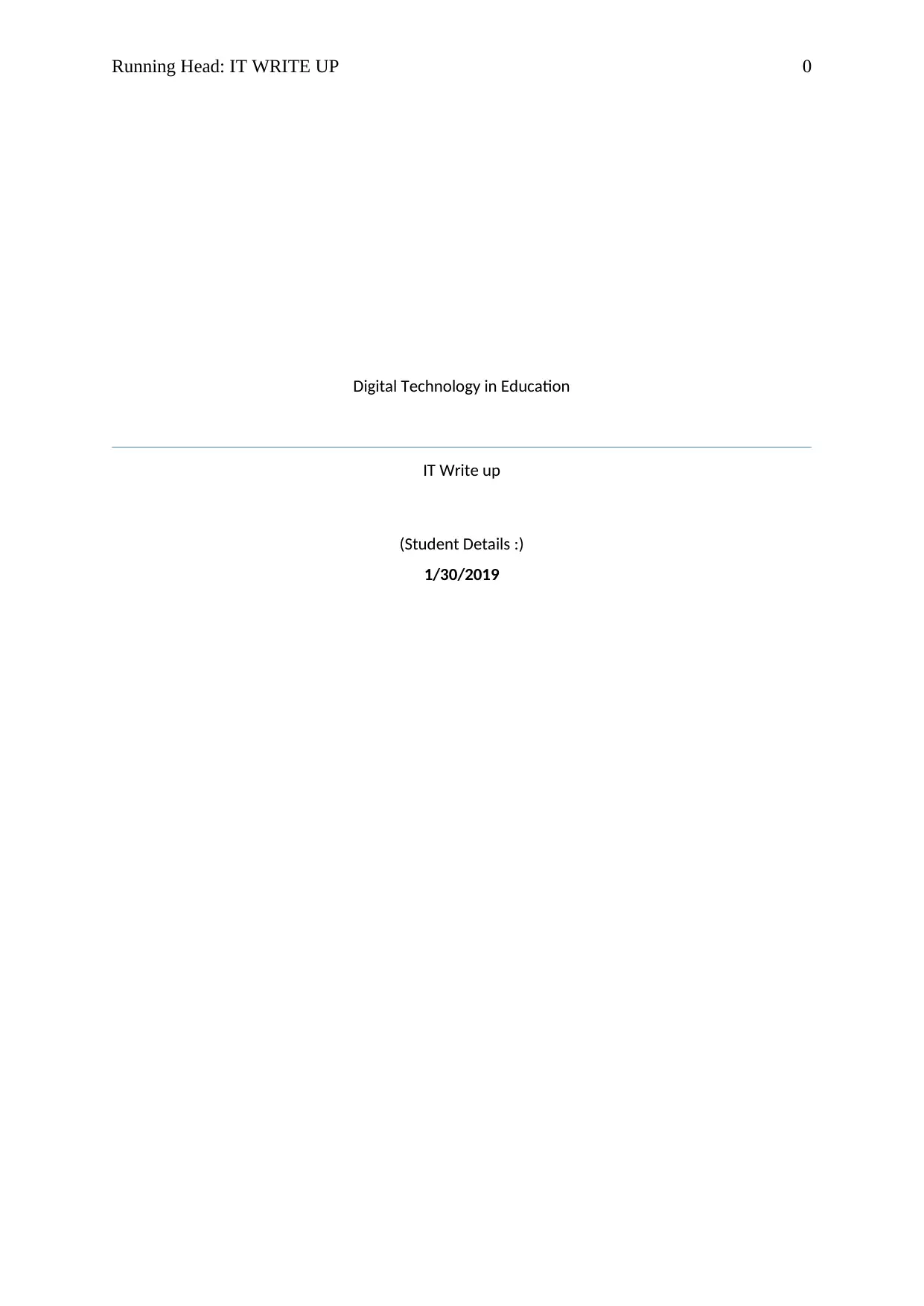
Running Head: IT WRITE UP 0
Digital Technology in Education
IT Write up
(Student Details :)
1/30/2019
Digital Technology in Education
IT Write up
(Student Details :)
1/30/2019
Paraphrase This Document
Need a fresh take? Get an instant paraphrase of this document with our AI Paraphraser
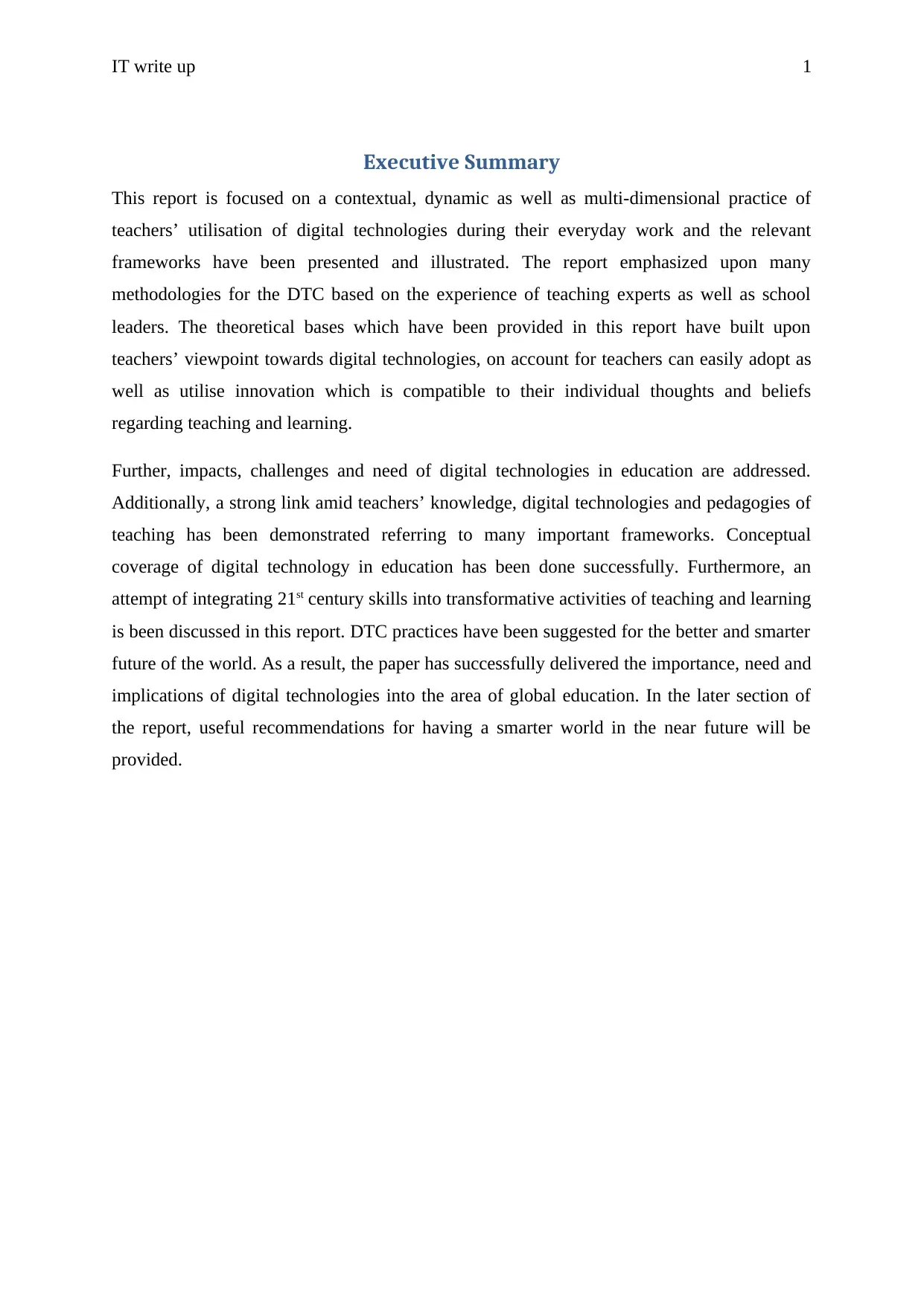
IT write up 1
Executive Summary
This report is focused on a contextual, dynamic as well as multi-dimensional practice of
teachers’ utilisation of digital technologies during their everyday work and the relevant
frameworks have been presented and illustrated. The report emphasized upon many
methodologies for the DTC based on the experience of teaching experts as well as school
leaders. The theoretical bases which have been provided in this report have built upon
teachers’ viewpoint towards digital technologies, on account for teachers can easily adopt as
well as utilise innovation which is compatible to their individual thoughts and beliefs
regarding teaching and learning.
Further, impacts, challenges and need of digital technologies in education are addressed.
Additionally, a strong link amid teachers’ knowledge, digital technologies and pedagogies of
teaching has been demonstrated referring to many important frameworks. Conceptual
coverage of digital technology in education has been done successfully. Furthermore, an
attempt of integrating 21st century skills into transformative activities of teaching and learning
is been discussed in this report. DTC practices have been suggested for the better and smarter
future of the world. As a result, the paper has successfully delivered the importance, need and
implications of digital technologies into the area of global education. In the later section of
the report, useful recommendations for having a smarter world in the near future will be
provided.
Executive Summary
This report is focused on a contextual, dynamic as well as multi-dimensional practice of
teachers’ utilisation of digital technologies during their everyday work and the relevant
frameworks have been presented and illustrated. The report emphasized upon many
methodologies for the DTC based on the experience of teaching experts as well as school
leaders. The theoretical bases which have been provided in this report have built upon
teachers’ viewpoint towards digital technologies, on account for teachers can easily adopt as
well as utilise innovation which is compatible to their individual thoughts and beliefs
regarding teaching and learning.
Further, impacts, challenges and need of digital technologies in education are addressed.
Additionally, a strong link amid teachers’ knowledge, digital technologies and pedagogies of
teaching has been demonstrated referring to many important frameworks. Conceptual
coverage of digital technology in education has been done successfully. Furthermore, an
attempt of integrating 21st century skills into transformative activities of teaching and learning
is been discussed in this report. DTC practices have been suggested for the better and smarter
future of the world. As a result, the paper has successfully delivered the importance, need and
implications of digital technologies into the area of global education. In the later section of
the report, useful recommendations for having a smarter world in the near future will be
provided.
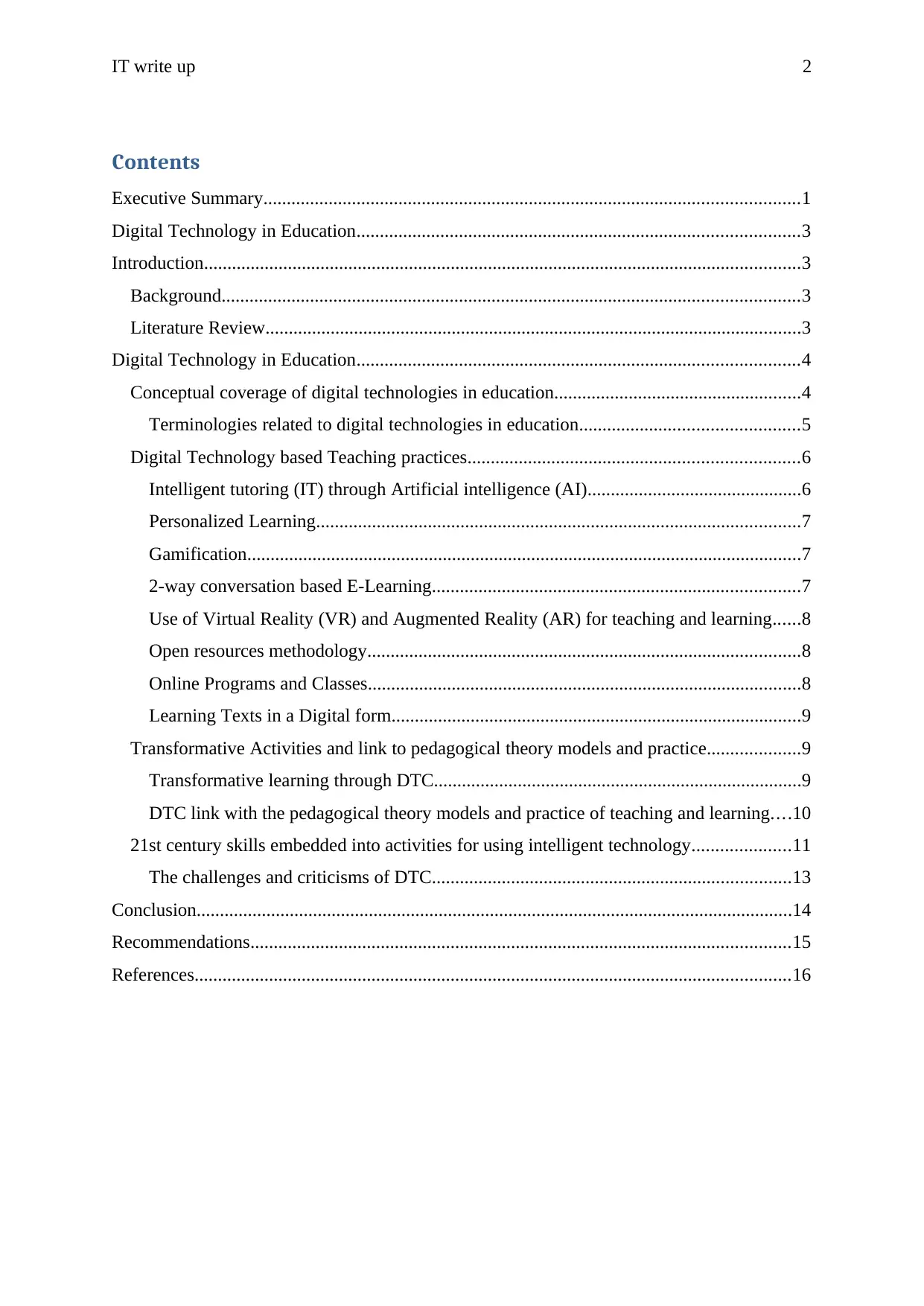
IT write up 2
Contents
Executive Summary...................................................................................................................1
Digital Technology in Education...............................................................................................3
Introduction................................................................................................................................3
Background............................................................................................................................3
Literature Review...................................................................................................................3
Digital Technology in Education...............................................................................................4
Conceptual coverage of digital technologies in education.....................................................4
Terminologies related to digital technologies in education...............................................5
Digital Technology based Teaching practices.......................................................................6
Intelligent tutoring (IT) through Artificial intelligence (AI)..............................................6
Personalized Learning........................................................................................................7
Gamification.......................................................................................................................7
2-way conversation based E-Learning...............................................................................7
Use of Virtual Reality (VR) and Augmented Reality (AR) for teaching and learning......8
Open resources methodology.............................................................................................8
Online Programs and Classes.............................................................................................8
Learning Texts in a Digital form........................................................................................9
Transformative Activities and link to pedagogical theory models and practice....................9
Transformative learning through DTC...............................................................................9
DTC link with the pedagogical theory models and practice of teaching and learning....10
21st century skills embedded into activities for using intelligent technology.....................11
The challenges and criticisms of DTC.............................................................................13
Conclusion................................................................................................................................14
Recommendations....................................................................................................................15
References................................................................................................................................16
Contents
Executive Summary...................................................................................................................1
Digital Technology in Education...............................................................................................3
Introduction................................................................................................................................3
Background............................................................................................................................3
Literature Review...................................................................................................................3
Digital Technology in Education...............................................................................................4
Conceptual coverage of digital technologies in education.....................................................4
Terminologies related to digital technologies in education...............................................5
Digital Technology based Teaching practices.......................................................................6
Intelligent tutoring (IT) through Artificial intelligence (AI)..............................................6
Personalized Learning........................................................................................................7
Gamification.......................................................................................................................7
2-way conversation based E-Learning...............................................................................7
Use of Virtual Reality (VR) and Augmented Reality (AR) for teaching and learning......8
Open resources methodology.............................................................................................8
Online Programs and Classes.............................................................................................8
Learning Texts in a Digital form........................................................................................9
Transformative Activities and link to pedagogical theory models and practice....................9
Transformative learning through DTC...............................................................................9
DTC link with the pedagogical theory models and practice of teaching and learning....10
21st century skills embedded into activities for using intelligent technology.....................11
The challenges and criticisms of DTC.............................................................................13
Conclusion................................................................................................................................14
Recommendations....................................................................................................................15
References................................................................................................................................16
⊘ This is a preview!⊘
Do you want full access?
Subscribe today to unlock all pages.

Trusted by 1+ million students worldwide
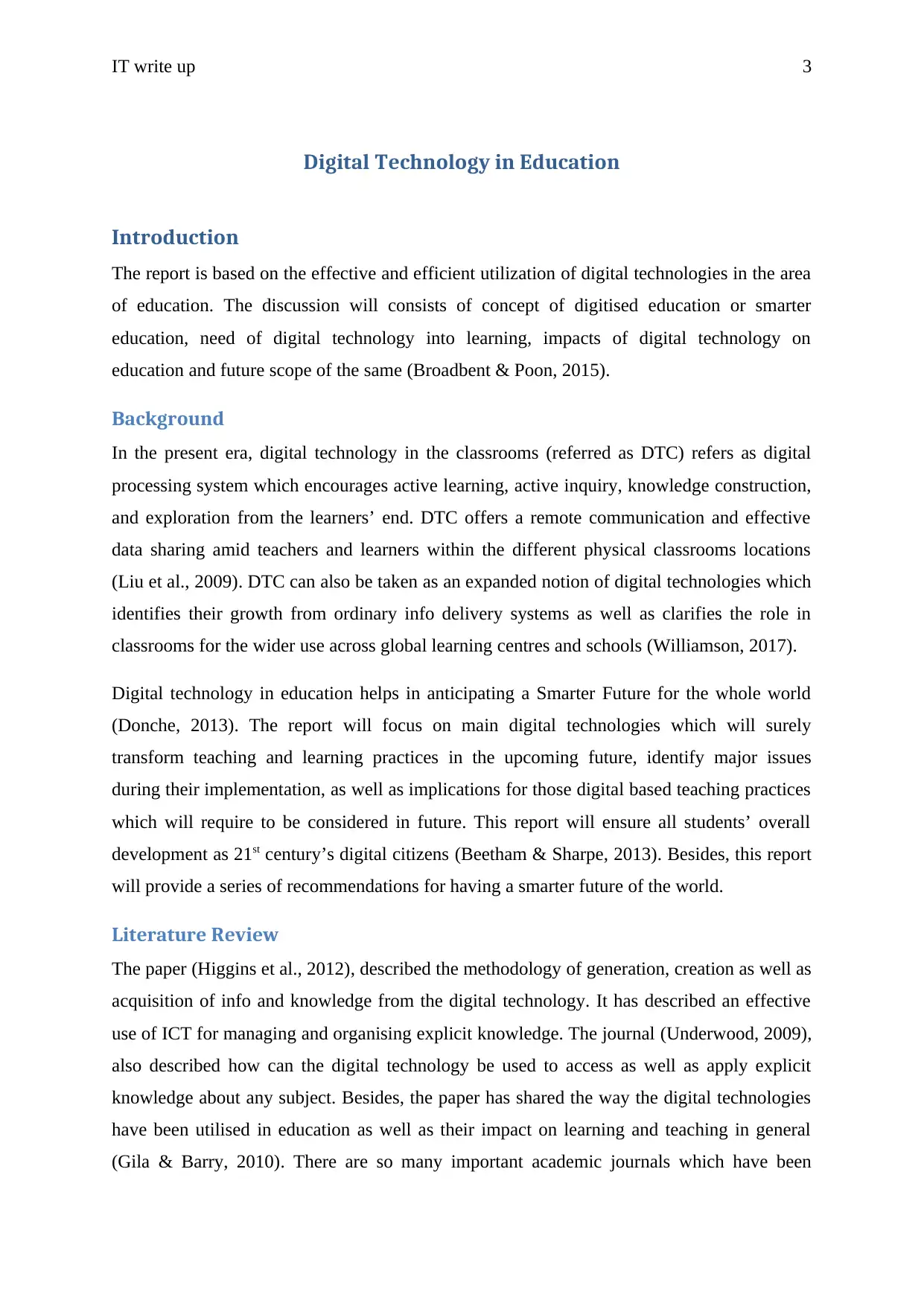
IT write up 3
Digital Technology in Education
Introduction
The report is based on the effective and efficient utilization of digital technologies in the area
of education. The discussion will consists of concept of digitised education or smarter
education, need of digital technology into learning, impacts of digital technology on
education and future scope of the same (Broadbent & Poon, 2015).
Background
In the present era, digital technology in the classrooms (referred as DTC) refers as digital
processing system which encourages active learning, active inquiry, knowledge construction,
and exploration from the learners’ end. DTC offers a remote communication and effective
data sharing amid teachers and learners within the different physical classrooms locations
(Liu et al., 2009). DTC can also be taken as an expanded notion of digital technologies which
identifies their growth from ordinary info delivery systems as well as clarifies the role in
classrooms for the wider use across global learning centres and schools (Williamson, 2017).
Digital technology in education helps in anticipating a Smarter Future for the whole world
(Donche, 2013). The report will focus on main digital technologies which will surely
transform teaching and learning practices in the upcoming future, identify major issues
during their implementation, as well as implications for those digital based teaching practices
which will require to be considered in future. This report will ensure all students’ overall
development as 21st century’s digital citizens (Beetham & Sharpe, 2013). Besides, this report
will provide a series of recommendations for having a smarter future of the world.
Literature Review
The paper (Higgins et al., 2012), described the methodology of generation, creation as well as
acquisition of info and knowledge from the digital technology. It has described an effective
use of ICT for managing and organising explicit knowledge. The journal (Underwood, 2009),
also described how can the digital technology be used to access as well as apply explicit
knowledge about any subject. Besides, the paper has shared the way the digital technologies
have been utilised in education as well as their impact on learning and teaching in general
(Gila & Barry, 2010). There are so many important academic journals which have been
Digital Technology in Education
Introduction
The report is based on the effective and efficient utilization of digital technologies in the area
of education. The discussion will consists of concept of digitised education or smarter
education, need of digital technology into learning, impacts of digital technology on
education and future scope of the same (Broadbent & Poon, 2015).
Background
In the present era, digital technology in the classrooms (referred as DTC) refers as digital
processing system which encourages active learning, active inquiry, knowledge construction,
and exploration from the learners’ end. DTC offers a remote communication and effective
data sharing amid teachers and learners within the different physical classrooms locations
(Liu et al., 2009). DTC can also be taken as an expanded notion of digital technologies which
identifies their growth from ordinary info delivery systems as well as clarifies the role in
classrooms for the wider use across global learning centres and schools (Williamson, 2017).
Digital technology in education helps in anticipating a Smarter Future for the whole world
(Donche, 2013). The report will focus on main digital technologies which will surely
transform teaching and learning practices in the upcoming future, identify major issues
during their implementation, as well as implications for those digital based teaching practices
which will require to be considered in future. This report will ensure all students’ overall
development as 21st century’s digital citizens (Beetham & Sharpe, 2013). Besides, this report
will provide a series of recommendations for having a smarter future of the world.
Literature Review
The paper (Higgins et al., 2012), described the methodology of generation, creation as well as
acquisition of info and knowledge from the digital technology. It has described an effective
use of ICT for managing and organising explicit knowledge. The journal (Underwood, 2009),
also described how can the digital technology be used to access as well as apply explicit
knowledge about any subject. Besides, the paper has shared the way the digital technologies
have been utilised in education as well as their impact on learning and teaching in general
(Gila & Barry, 2010). There are so many important academic journals which have been
Paraphrase This Document
Need a fresh take? Get an instant paraphrase of this document with our AI Paraphraser
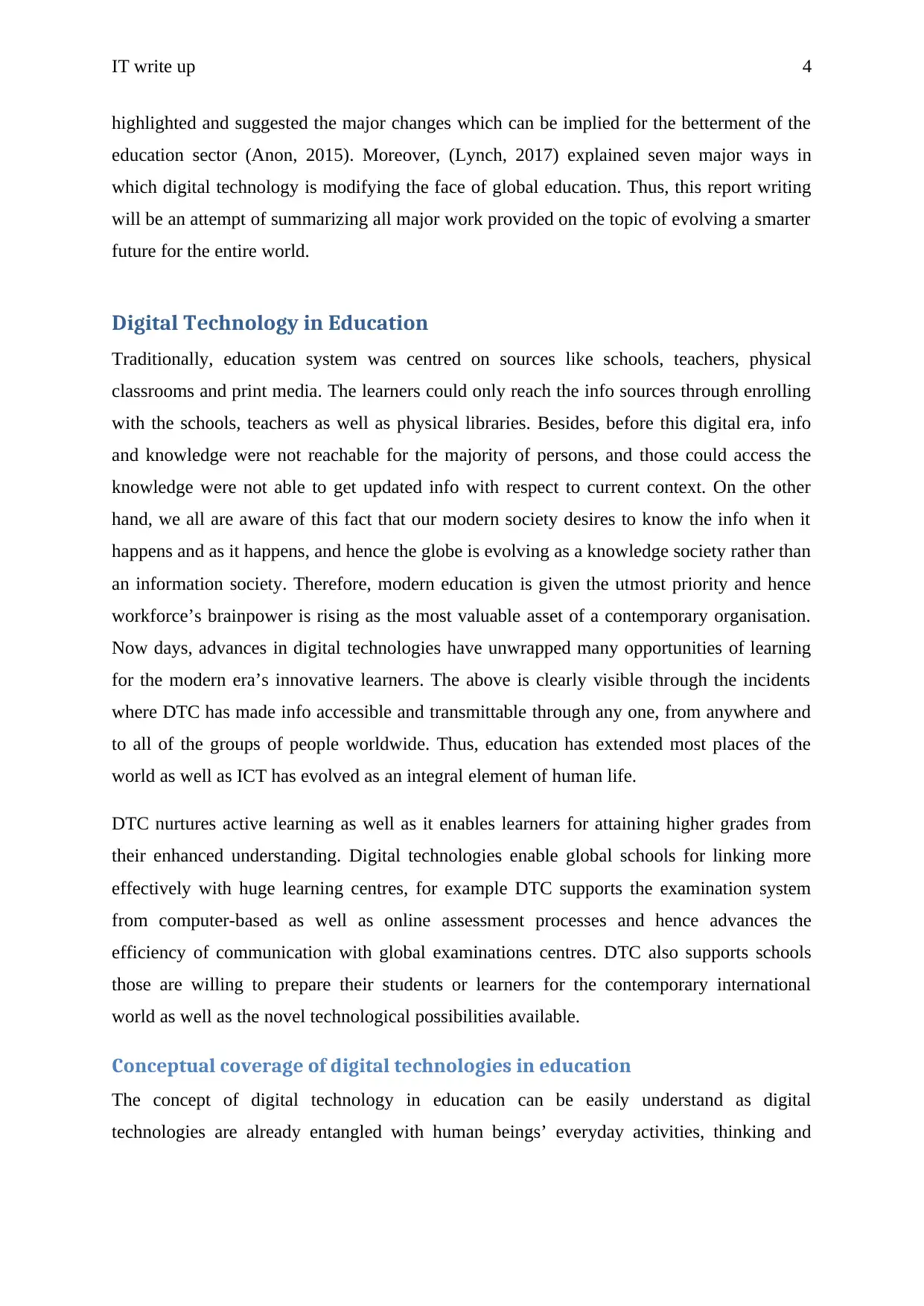
IT write up 4
highlighted and suggested the major changes which can be implied for the betterment of the
education sector (Anon, 2015). Moreover, (Lynch, 2017) explained seven major ways in
which digital technology is modifying the face of global education. Thus, this report writing
will be an attempt of summarizing all major work provided on the topic of evolving a smarter
future for the entire world.
Digital Technology in Education
Traditionally, education system was centred on sources like schools, teachers, physical
classrooms and print media. The learners could only reach the info sources through enrolling
with the schools, teachers as well as physical libraries. Besides, before this digital era, info
and knowledge were not reachable for the majority of persons, and those could access the
knowledge were not able to get updated info with respect to current context. On the other
hand, we all are aware of this fact that our modern society desires to know the info when it
happens and as it happens, and hence the globe is evolving as a knowledge society rather than
an information society. Therefore, modern education is given the utmost priority and hence
workforce’s brainpower is rising as the most valuable asset of a contemporary organisation.
Now days, advances in digital technologies have unwrapped many opportunities of learning
for the modern era’s innovative learners. The above is clearly visible through the incidents
where DTC has made info accessible and transmittable through any one, from anywhere and
to all of the groups of people worldwide. Thus, education has extended most places of the
world as well as ICT has evolved as an integral element of human life.
DTC nurtures active learning as well as it enables learners for attaining higher grades from
their enhanced understanding. Digital technologies enable global schools for linking more
effectively with huge learning centres, for example DTC supports the examination system
from computer-based as well as online assessment processes and hence advances the
efficiency of communication with global examinations centres. DTC also supports schools
those are willing to prepare their students or learners for the contemporary international
world as well as the novel technological possibilities available.
Conceptual coverage of digital technologies in education
The concept of digital technology in education can be easily understand as digital
technologies are already entangled with human beings’ everyday activities, thinking and
highlighted and suggested the major changes which can be implied for the betterment of the
education sector (Anon, 2015). Moreover, (Lynch, 2017) explained seven major ways in
which digital technology is modifying the face of global education. Thus, this report writing
will be an attempt of summarizing all major work provided on the topic of evolving a smarter
future for the entire world.
Digital Technology in Education
Traditionally, education system was centred on sources like schools, teachers, physical
classrooms and print media. The learners could only reach the info sources through enrolling
with the schools, teachers as well as physical libraries. Besides, before this digital era, info
and knowledge were not reachable for the majority of persons, and those could access the
knowledge were not able to get updated info with respect to current context. On the other
hand, we all are aware of this fact that our modern society desires to know the info when it
happens and as it happens, and hence the globe is evolving as a knowledge society rather than
an information society. Therefore, modern education is given the utmost priority and hence
workforce’s brainpower is rising as the most valuable asset of a contemporary organisation.
Now days, advances in digital technologies have unwrapped many opportunities of learning
for the modern era’s innovative learners. The above is clearly visible through the incidents
where DTC has made info accessible and transmittable through any one, from anywhere and
to all of the groups of people worldwide. Thus, education has extended most places of the
world as well as ICT has evolved as an integral element of human life.
DTC nurtures active learning as well as it enables learners for attaining higher grades from
their enhanced understanding. Digital technologies enable global schools for linking more
effectively with huge learning centres, for example DTC supports the examination system
from computer-based as well as online assessment processes and hence advances the
efficiency of communication with global examinations centres. DTC also supports schools
those are willing to prepare their students or learners for the contemporary international
world as well as the novel technological possibilities available.
Conceptual coverage of digital technologies in education
The concept of digital technology in education can be easily understand as digital
technologies are already entangled with human beings’ everyday activities, thinking and
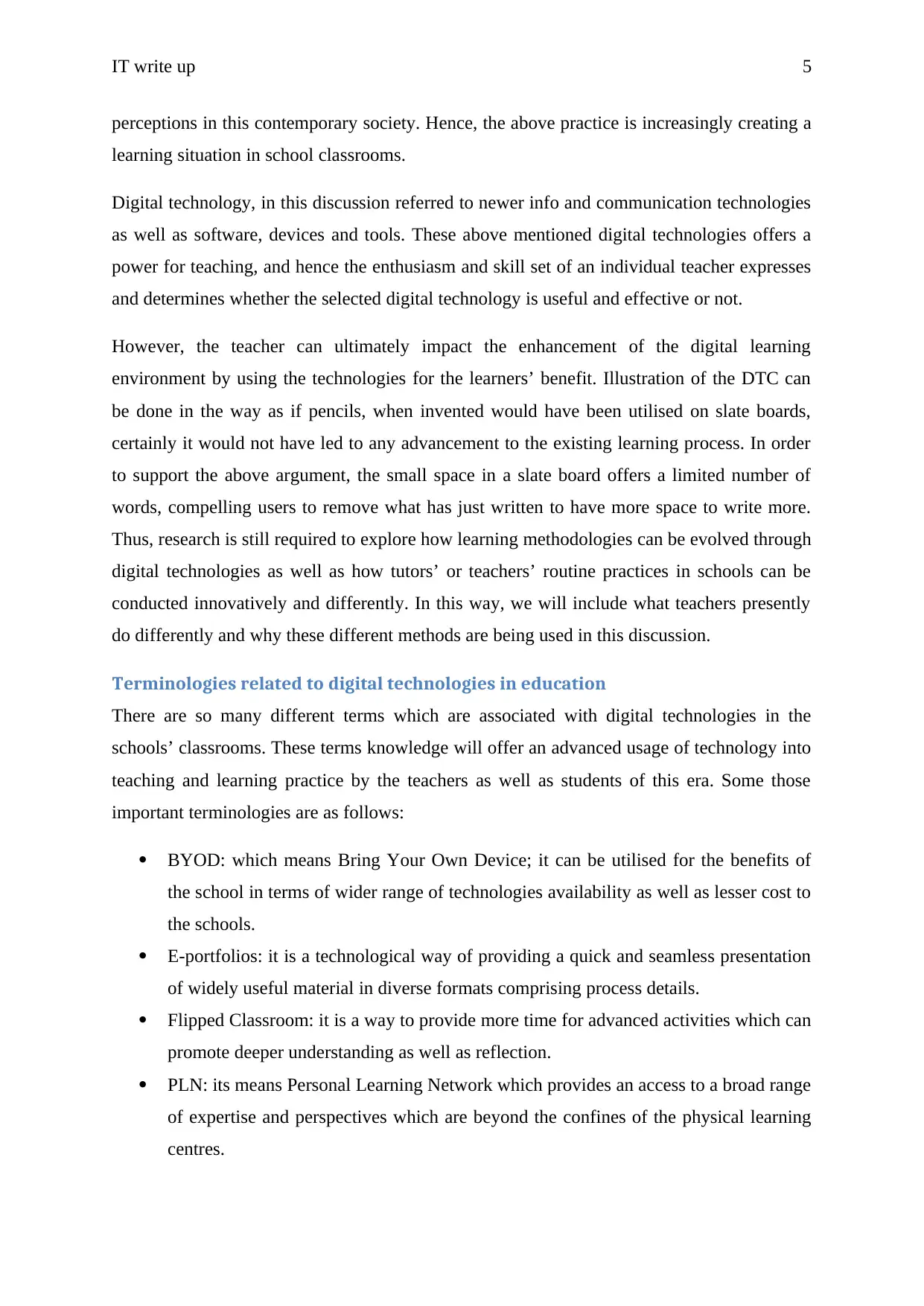
IT write up 5
perceptions in this contemporary society. Hence, the above practice is increasingly creating a
learning situation in school classrooms.
Digital technology, in this discussion referred to newer info and communication technologies
as well as software, devices and tools. These above mentioned digital technologies offers a
power for teaching, and hence the enthusiasm and skill set of an individual teacher expresses
and determines whether the selected digital technology is useful and effective or not.
However, the teacher can ultimately impact the enhancement of the digital learning
environment by using the technologies for the learners’ benefit. Illustration of the DTC can
be done in the way as if pencils, when invented would have been utilised on slate boards,
certainly it would not have led to any advancement to the existing learning process. In order
to support the above argument, the small space in a slate board offers a limited number of
words, compelling users to remove what has just written to have more space to write more.
Thus, research is still required to explore how learning methodologies can be evolved through
digital technologies as well as how tutors’ or teachers’ routine practices in schools can be
conducted innovatively and differently. In this way, we will include what teachers presently
do differently and why these different methods are being used in this discussion.
Terminologies related to digital technologies in education
There are so many different terms which are associated with digital technologies in the
schools’ classrooms. These terms knowledge will offer an advanced usage of technology into
teaching and learning practice by the teachers as well as students of this era. Some those
important terminologies are as follows:
BYOD: which means Bring Your Own Device; it can be utilised for the benefits of
the school in terms of wider range of technologies availability as well as lesser cost to
the schools.
E-portfolios: it is a technological way of providing a quick and seamless presentation
of widely useful material in diverse formats comprising process details.
Flipped Classroom: it is a way to provide more time for advanced activities which can
promote deeper understanding as well as reflection.
PLN: its means Personal Learning Network which provides an access to a broad range
of expertise and perspectives which are beyond the confines of the physical learning
centres.
perceptions in this contemporary society. Hence, the above practice is increasingly creating a
learning situation in school classrooms.
Digital technology, in this discussion referred to newer info and communication technologies
as well as software, devices and tools. These above mentioned digital technologies offers a
power for teaching, and hence the enthusiasm and skill set of an individual teacher expresses
and determines whether the selected digital technology is useful and effective or not.
However, the teacher can ultimately impact the enhancement of the digital learning
environment by using the technologies for the learners’ benefit. Illustration of the DTC can
be done in the way as if pencils, when invented would have been utilised on slate boards,
certainly it would not have led to any advancement to the existing learning process. In order
to support the above argument, the small space in a slate board offers a limited number of
words, compelling users to remove what has just written to have more space to write more.
Thus, research is still required to explore how learning methodologies can be evolved through
digital technologies as well as how tutors’ or teachers’ routine practices in schools can be
conducted innovatively and differently. In this way, we will include what teachers presently
do differently and why these different methods are being used in this discussion.
Terminologies related to digital technologies in education
There are so many different terms which are associated with digital technologies in the
schools’ classrooms. These terms knowledge will offer an advanced usage of technology into
teaching and learning practice by the teachers as well as students of this era. Some those
important terminologies are as follows:
BYOD: which means Bring Your Own Device; it can be utilised for the benefits of
the school in terms of wider range of technologies availability as well as lesser cost to
the schools.
E-portfolios: it is a technological way of providing a quick and seamless presentation
of widely useful material in diverse formats comprising process details.
Flipped Classroom: it is a way to provide more time for advanced activities which can
promote deeper understanding as well as reflection.
PLN: its means Personal Learning Network which provides an access to a broad range
of expertise and perspectives which are beyond the confines of the physical learning
centres.
⊘ This is a preview!⊘
Do you want full access?
Subscribe today to unlock all pages.

Trusted by 1+ million students worldwide
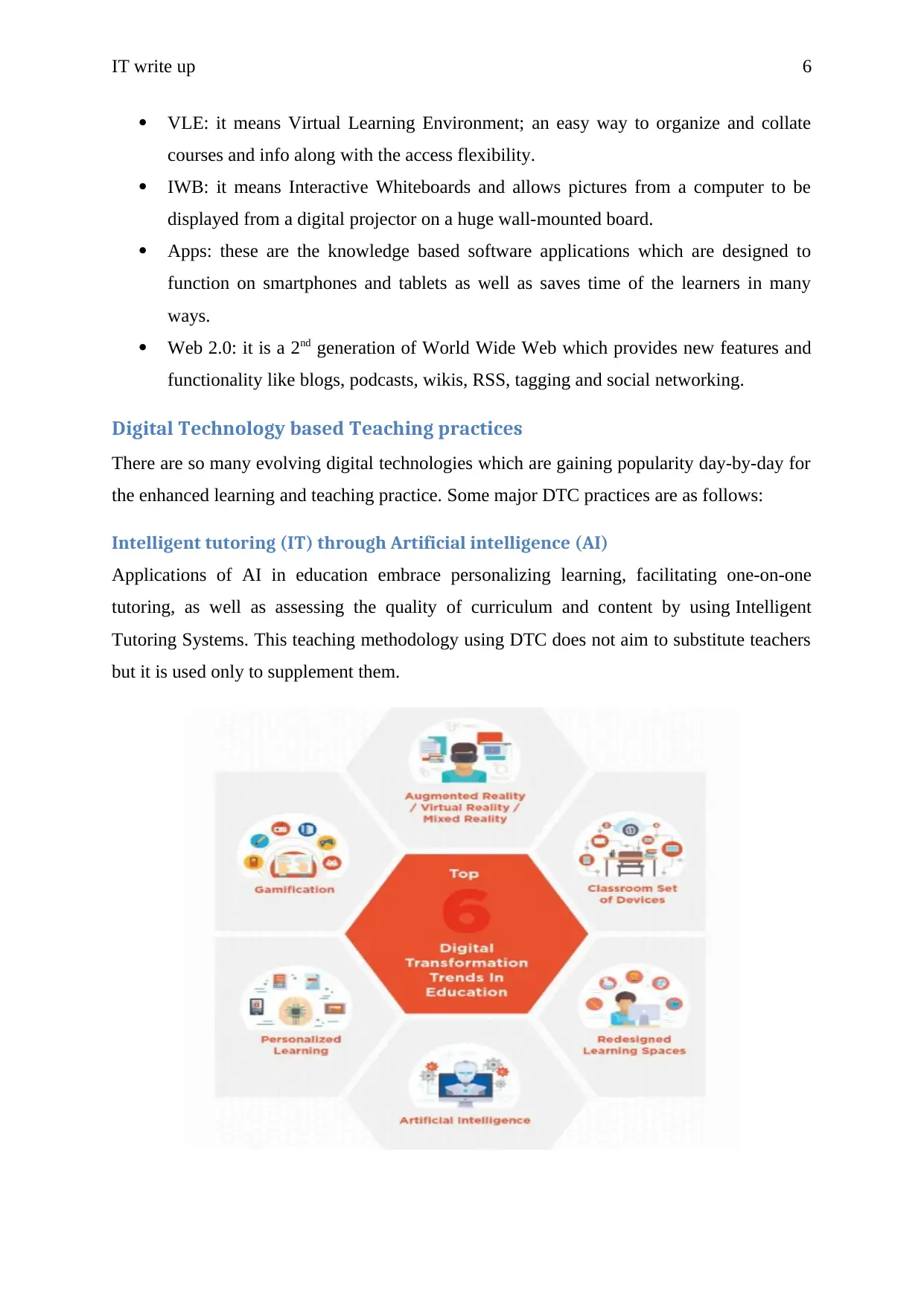
IT write up 6
VLE: it means Virtual Learning Environment; an easy way to organize and collate
courses and info along with the access flexibility.
IWB: it means Interactive Whiteboards and allows pictures from a computer to be
displayed from a digital projector on a huge wall-mounted board.
Apps: these are the knowledge based software applications which are designed to
function on smartphones and tablets as well as saves time of the learners in many
ways.
Web 2.0: it is a 2nd generation of World Wide Web which provides new features and
functionality like blogs, podcasts, wikis, RSS, tagging and social networking.
Digital Technology based Teaching practices
There are so many evolving digital technologies which are gaining popularity day-by-day for
the enhanced learning and teaching practice. Some major DTC practices are as follows:
Intelligent tutoring (IT) through Artificial intelligence (AI)
Applications of AI in education embrace personalizing learning, facilitating one-on-one
tutoring, as well as assessing the quality of curriculum and content by using Intelligent
Tutoring Systems. This teaching methodology using DTC does not aim to substitute teachers
but it is used only to supplement them.
VLE: it means Virtual Learning Environment; an easy way to organize and collate
courses and info along with the access flexibility.
IWB: it means Interactive Whiteboards and allows pictures from a computer to be
displayed from a digital projector on a huge wall-mounted board.
Apps: these are the knowledge based software applications which are designed to
function on smartphones and tablets as well as saves time of the learners in many
ways.
Web 2.0: it is a 2nd generation of World Wide Web which provides new features and
functionality like blogs, podcasts, wikis, RSS, tagging and social networking.
Digital Technology based Teaching practices
There are so many evolving digital technologies which are gaining popularity day-by-day for
the enhanced learning and teaching practice. Some major DTC practices are as follows:
Intelligent tutoring (IT) through Artificial intelligence (AI)
Applications of AI in education embrace personalizing learning, facilitating one-on-one
tutoring, as well as assessing the quality of curriculum and content by using Intelligent
Tutoring Systems. This teaching methodology using DTC does not aim to substitute teachers
but it is used only to supplement them.
Paraphrase This Document
Need a fresh take? Get an instant paraphrase of this document with our AI Paraphraser
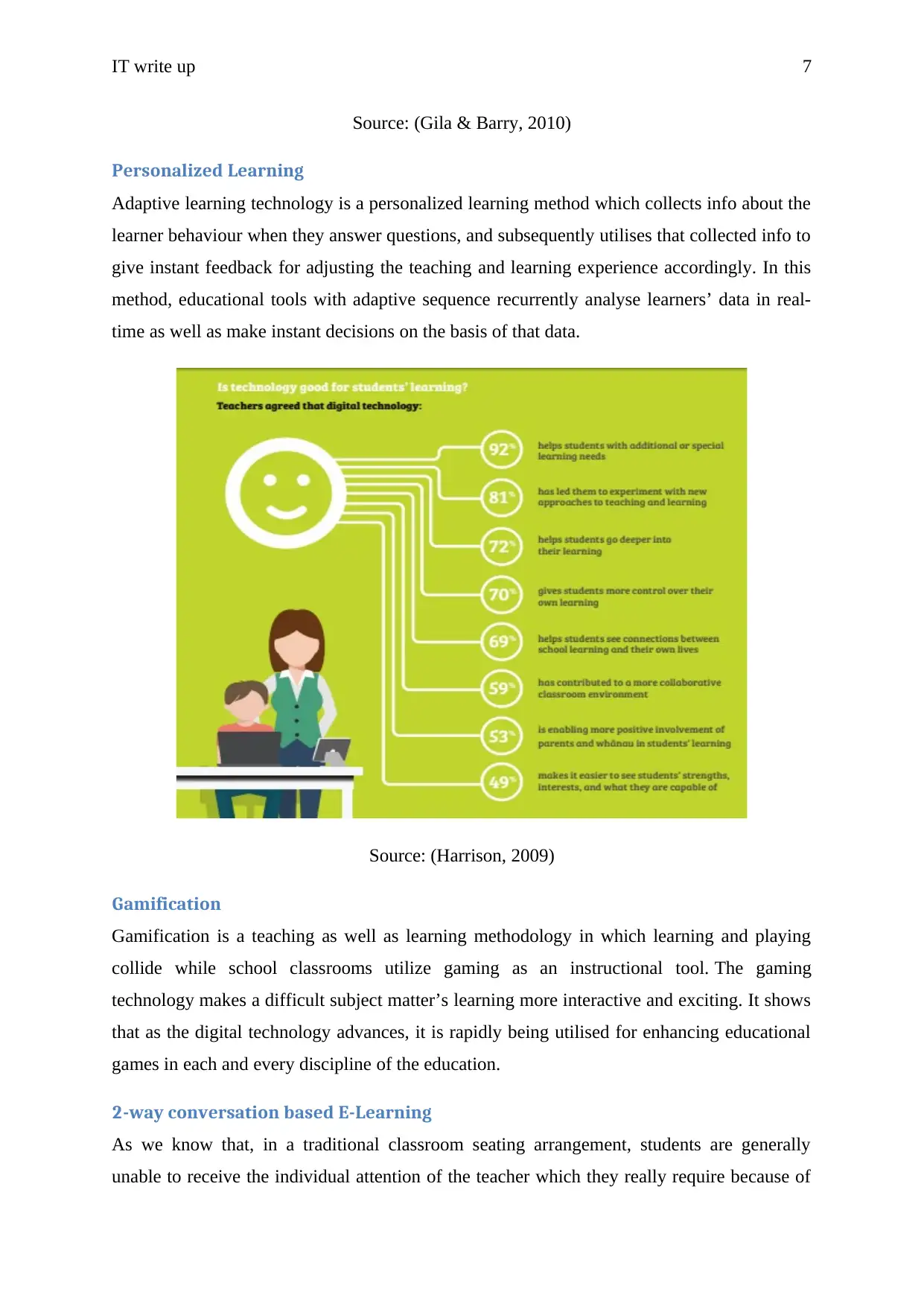
IT write up 7
Source: (Gila & Barry, 2010)
Personalized Learning
Adaptive learning technology is a personalized learning method which collects info about the
learner behaviour when they answer questions, and subsequently utilises that collected info to
give instant feedback for adjusting the teaching and learning experience accordingly. In this
method, educational tools with adaptive sequence recurrently analyse learners’ data in real-
time as well as make instant decisions on the basis of that data.
Source: (Harrison, 2009)
Gamification
Gamification is a teaching as well as learning methodology in which learning and playing
collide while school classrooms utilize gaming as an instructional tool. The gaming
technology makes a difficult subject matter’s learning more interactive and exciting. It shows
that as the digital technology advances, it is rapidly being utilised for enhancing educational
games in each and every discipline of the education.
2-way conversation based E-Learning
As we know that, in a traditional classroom seating arrangement, students are generally
unable to receive the individual attention of the teacher which they really require because of
Source: (Gila & Barry, 2010)
Personalized Learning
Adaptive learning technology is a personalized learning method which collects info about the
learner behaviour when they answer questions, and subsequently utilises that collected info to
give instant feedback for adjusting the teaching and learning experience accordingly. In this
method, educational tools with adaptive sequence recurrently analyse learners’ data in real-
time as well as make instant decisions on the basis of that data.
Source: (Harrison, 2009)
Gamification
Gamification is a teaching as well as learning methodology in which learning and playing
collide while school classrooms utilize gaming as an instructional tool. The gaming
technology makes a difficult subject matter’s learning more interactive and exciting. It shows
that as the digital technology advances, it is rapidly being utilised for enhancing educational
games in each and every discipline of the education.
2-way conversation based E-Learning
As we know that, in a traditional classroom seating arrangement, students are generally
unable to receive the individual attention of the teacher which they really require because of
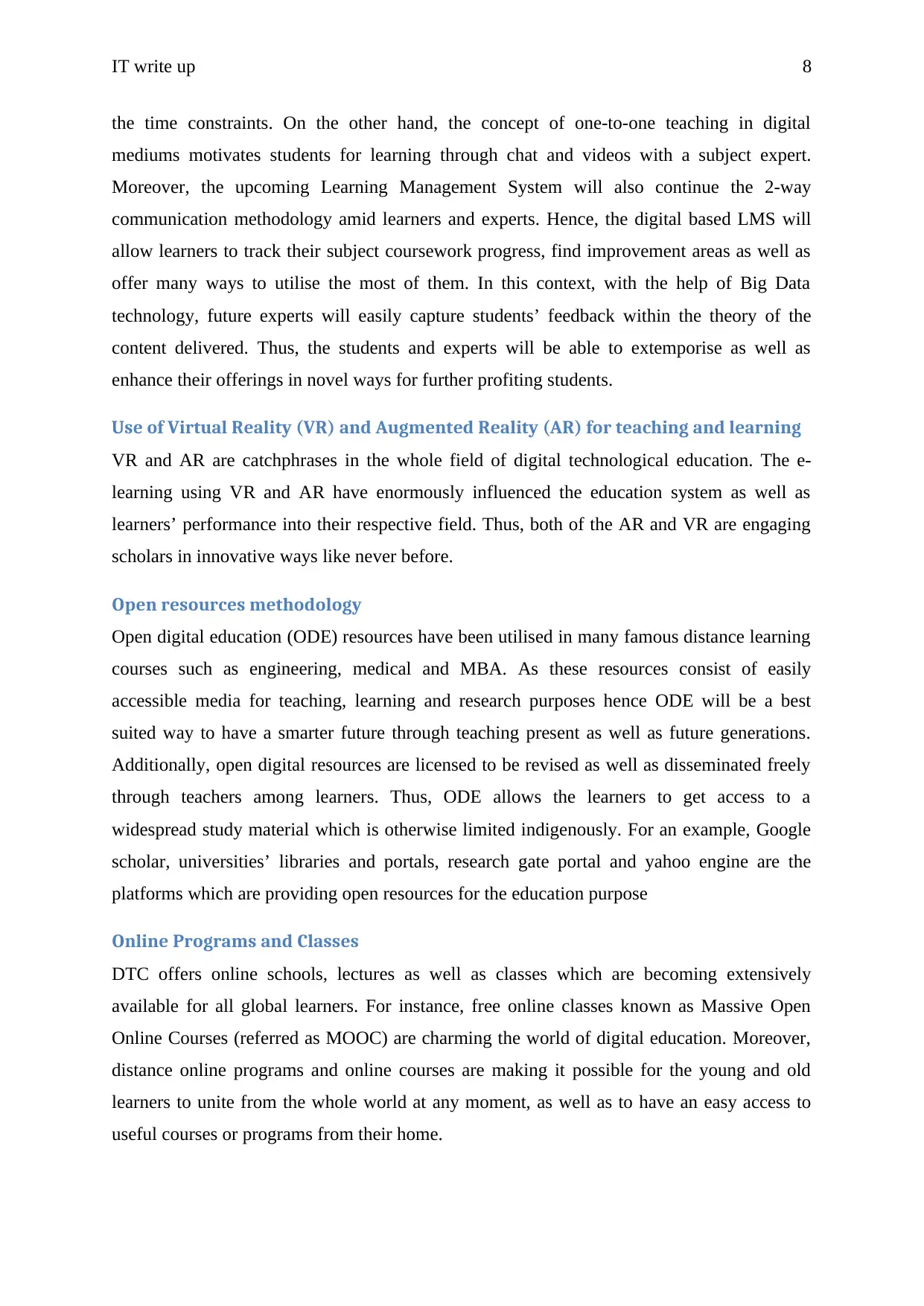
IT write up 8
the time constraints. On the other hand, the concept of one-to-one teaching in digital
mediums motivates students for learning through chat and videos with a subject expert.
Moreover, the upcoming Learning Management System will also continue the 2-way
communication methodology amid learners and experts. Hence, the digital based LMS will
allow learners to track their subject coursework progress, find improvement areas as well as
offer many ways to utilise the most of them. In this context, with the help of Big Data
technology, future experts will easily capture students’ feedback within the theory of the
content delivered. Thus, the students and experts will be able to extemporise as well as
enhance their offerings in novel ways for further profiting students.
Use of Virtual Reality (VR) and Augmented Reality (AR) for teaching and learning
VR and AR are catchphrases in the whole field of digital technological education. The e-
learning using VR and AR have enormously influenced the education system as well as
learners’ performance into their respective field. Thus, both of the AR and VR are engaging
scholars in innovative ways like never before.
Open resources methodology
Open digital education (ODE) resources have been utilised in many famous distance learning
courses such as engineering, medical and MBA. As these resources consist of easily
accessible media for teaching, learning and research purposes hence ODE will be a best
suited way to have a smarter future through teaching present as well as future generations.
Additionally, open digital resources are licensed to be revised as well as disseminated freely
through teachers among learners. Thus, ODE allows the learners to get access to a
widespread study material which is otherwise limited indigenously. For an example, Google
scholar, universities’ libraries and portals, research gate portal and yahoo engine are the
platforms which are providing open resources for the education purpose
Online Programs and Classes
DTC offers online schools, lectures as well as classes which are becoming extensively
available for all global learners. For instance, free online classes known as Massive Open
Online Courses (referred as MOOC) are charming the world of digital education. Moreover,
distance online programs and online courses are making it possible for the young and old
learners to unite from the whole world at any moment, as well as to have an easy access to
useful courses or programs from their home.
the time constraints. On the other hand, the concept of one-to-one teaching in digital
mediums motivates students for learning through chat and videos with a subject expert.
Moreover, the upcoming Learning Management System will also continue the 2-way
communication methodology amid learners and experts. Hence, the digital based LMS will
allow learners to track their subject coursework progress, find improvement areas as well as
offer many ways to utilise the most of them. In this context, with the help of Big Data
technology, future experts will easily capture students’ feedback within the theory of the
content delivered. Thus, the students and experts will be able to extemporise as well as
enhance their offerings in novel ways for further profiting students.
Use of Virtual Reality (VR) and Augmented Reality (AR) for teaching and learning
VR and AR are catchphrases in the whole field of digital technological education. The e-
learning using VR and AR have enormously influenced the education system as well as
learners’ performance into their respective field. Thus, both of the AR and VR are engaging
scholars in innovative ways like never before.
Open resources methodology
Open digital education (ODE) resources have been utilised in many famous distance learning
courses such as engineering, medical and MBA. As these resources consist of easily
accessible media for teaching, learning and research purposes hence ODE will be a best
suited way to have a smarter future through teaching present as well as future generations.
Additionally, open digital resources are licensed to be revised as well as disseminated freely
through teachers among learners. Thus, ODE allows the learners to get access to a
widespread study material which is otherwise limited indigenously. For an example, Google
scholar, universities’ libraries and portals, research gate portal and yahoo engine are the
platforms which are providing open resources for the education purpose
Online Programs and Classes
DTC offers online schools, lectures as well as classes which are becoming extensively
available for all global learners. For instance, free online classes known as Massive Open
Online Courses (referred as MOOC) are charming the world of digital education. Moreover,
distance online programs and online courses are making it possible for the young and old
learners to unite from the whole world at any moment, as well as to have an easy access to
useful courses or programs from their home.
⊘ This is a preview!⊘
Do you want full access?
Subscribe today to unlock all pages.

Trusted by 1+ million students worldwide
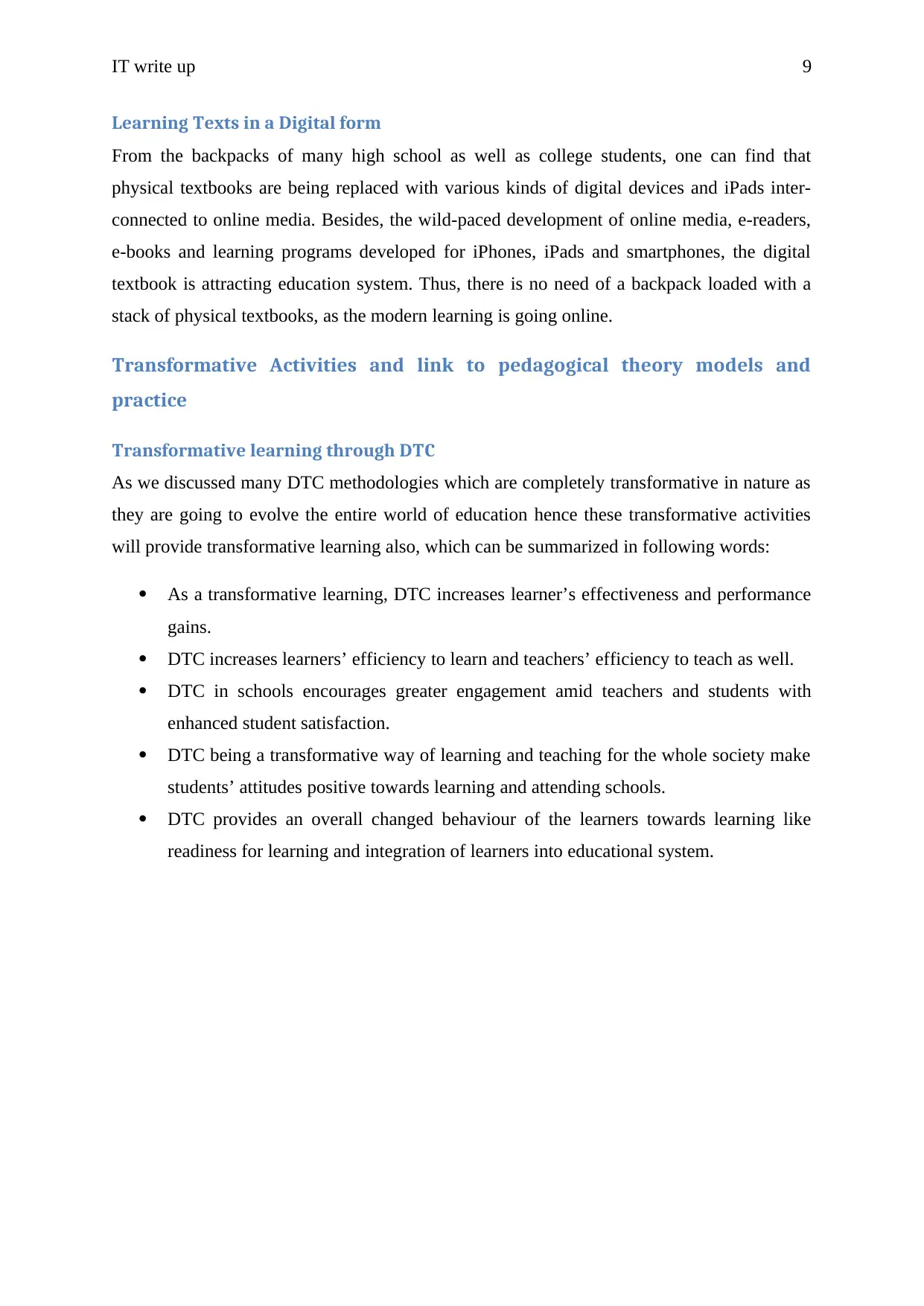
IT write up 9
Learning Texts in a Digital form
From the backpacks of many high school as well as college students, one can find that
physical textbooks are being replaced with various kinds of digital devices and iPads inter-
connected to online media. Besides, the wild-paced development of online media, e-readers,
e-books and learning programs developed for iPhones, iPads and smartphones, the digital
textbook is attracting education system. Thus, there is no need of a backpack loaded with a
stack of physical textbooks, as the modern learning is going online.
Transformative Activities and link to pedagogical theory models and
practice
Transformative learning through DTC
As we discussed many DTC methodologies which are completely transformative in nature as
they are going to evolve the entire world of education hence these transformative activities
will provide transformative learning also, which can be summarized in following words:
As a transformative learning, DTC increases learner’s effectiveness and performance
gains.
DTC increases learners’ efficiency to learn and teachers’ efficiency to teach as well.
DTC in schools encourages greater engagement amid teachers and students with
enhanced student satisfaction.
DTC being a transformative way of learning and teaching for the whole society make
students’ attitudes positive towards learning and attending schools.
DTC provides an overall changed behaviour of the learners towards learning like
readiness for learning and integration of learners into educational system.
Learning Texts in a Digital form
From the backpacks of many high school as well as college students, one can find that
physical textbooks are being replaced with various kinds of digital devices and iPads inter-
connected to online media. Besides, the wild-paced development of online media, e-readers,
e-books and learning programs developed for iPhones, iPads and smartphones, the digital
textbook is attracting education system. Thus, there is no need of a backpack loaded with a
stack of physical textbooks, as the modern learning is going online.
Transformative Activities and link to pedagogical theory models and
practice
Transformative learning through DTC
As we discussed many DTC methodologies which are completely transformative in nature as
they are going to evolve the entire world of education hence these transformative activities
will provide transformative learning also, which can be summarized in following words:
As a transformative learning, DTC increases learner’s effectiveness and performance
gains.
DTC increases learners’ efficiency to learn and teachers’ efficiency to teach as well.
DTC in schools encourages greater engagement amid teachers and students with
enhanced student satisfaction.
DTC being a transformative way of learning and teaching for the whole society make
students’ attitudes positive towards learning and attending schools.
DTC provides an overall changed behaviour of the learners towards learning like
readiness for learning and integration of learners into educational system.
Paraphrase This Document
Need a fresh take? Get an instant paraphrase of this document with our AI Paraphraser
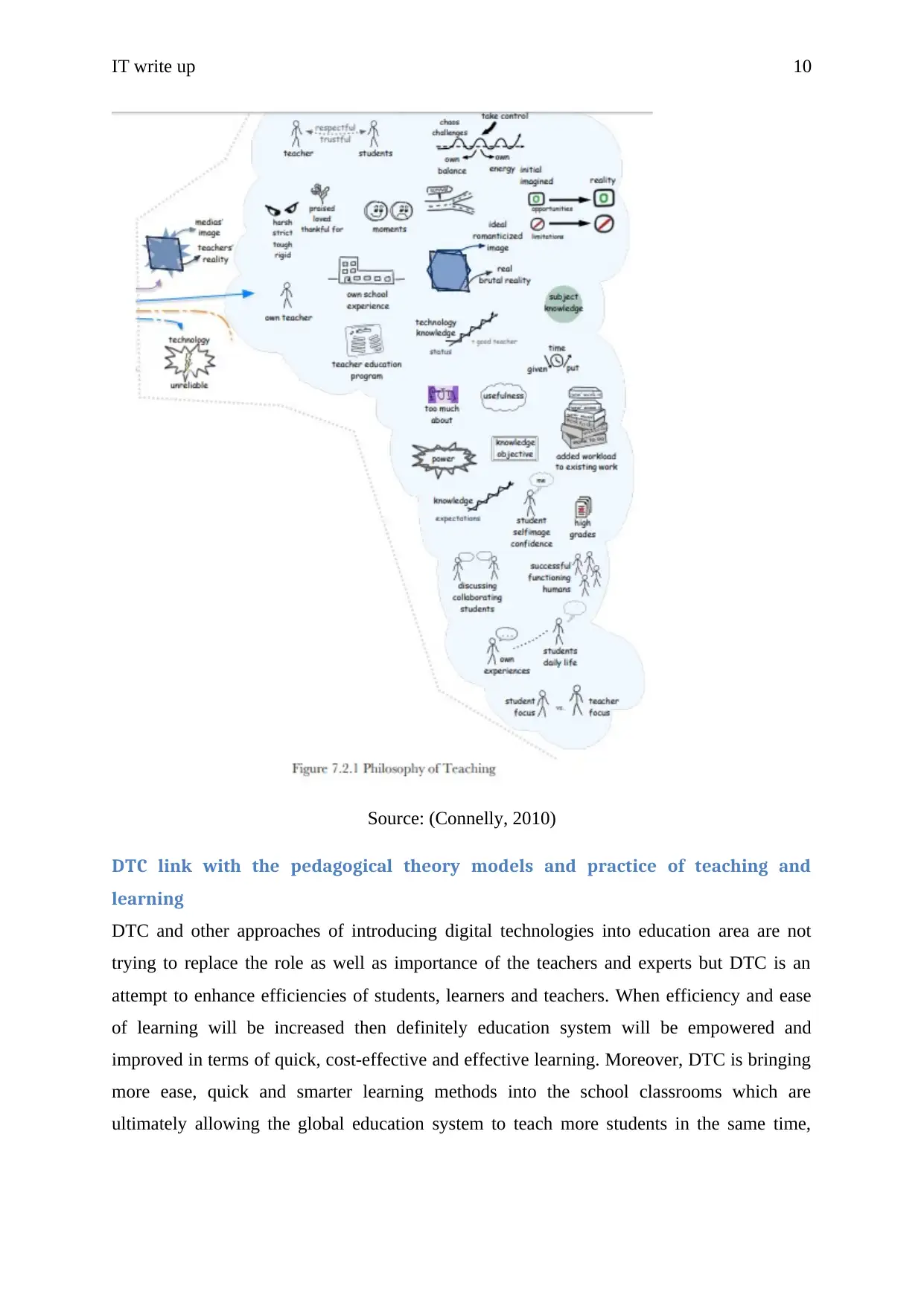
IT write up 10
Source: (Connelly, 2010)
DTC link with the pedagogical theory models and practice of teaching and
learning
DTC and other approaches of introducing digital technologies into education area are not
trying to replace the role as well as importance of the teachers and experts but DTC is an
attempt to enhance efficiencies of students, learners and teachers. When efficiency and ease
of learning will be increased then definitely education system will be empowered and
improved in terms of quick, cost-effective and effective learning. Moreover, DTC is bringing
more ease, quick and smarter learning methods into the school classrooms which are
ultimately allowing the global education system to teach more students in the same time,
Source: (Connelly, 2010)
DTC link with the pedagogical theory models and practice of teaching and
learning
DTC and other approaches of introducing digital technologies into education area are not
trying to replace the role as well as importance of the teachers and experts but DTC is an
attempt to enhance efficiencies of students, learners and teachers. When efficiency and ease
of learning will be increased then definitely education system will be empowered and
improved in terms of quick, cost-effective and effective learning. Moreover, DTC is bringing
more ease, quick and smarter learning methods into the school classrooms which are
ultimately allowing the global education system to teach more students in the same time,
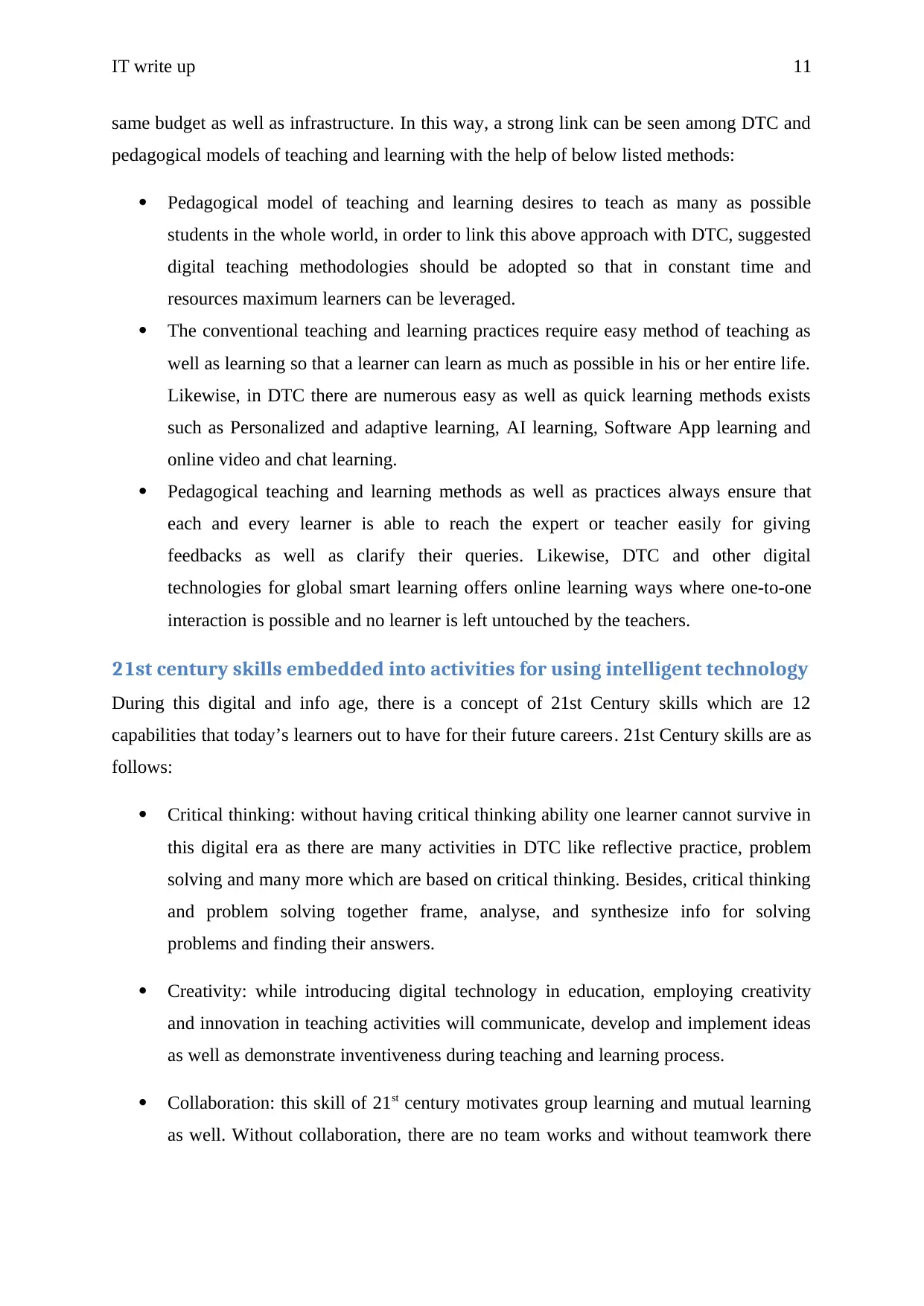
IT write up 11
same budget as well as infrastructure. In this way, a strong link can be seen among DTC and
pedagogical models of teaching and learning with the help of below listed methods:
Pedagogical model of teaching and learning desires to teach as many as possible
students in the whole world, in order to link this above approach with DTC, suggested
digital teaching methodologies should be adopted so that in constant time and
resources maximum learners can be leveraged.
The conventional teaching and learning practices require easy method of teaching as
well as learning so that a learner can learn as much as possible in his or her entire life.
Likewise, in DTC there are numerous easy as well as quick learning methods exists
such as Personalized and adaptive learning, AI learning, Software App learning and
online video and chat learning.
Pedagogical teaching and learning methods as well as practices always ensure that
each and every learner is able to reach the expert or teacher easily for giving
feedbacks as well as clarify their queries. Likewise, DTC and other digital
technologies for global smart learning offers online learning ways where one-to-one
interaction is possible and no learner is left untouched by the teachers.
21st century skills embedded into activities for using intelligent technology
During this digital and info age, there is a concept of 21st Century skills which are 12
capabilities that today’s learners out to have for their future careers. 21st Century skills are as
follows:
Critical thinking: without having critical thinking ability one learner cannot survive in
this digital era as there are many activities in DTC like reflective practice, problem
solving and many more which are based on critical thinking. Besides, critical thinking
and problem solving together frame, analyse, and synthesize info for solving
problems and finding their answers.
Creativity: while introducing digital technology in education, employing creativity
and innovation in teaching activities will communicate, develop and implement ideas
as well as demonstrate inventiveness during teaching and learning process.
Collaboration: this skill of 21st century motivates group learning and mutual learning
as well. Without collaboration, there are no team works and without teamwork there
same budget as well as infrastructure. In this way, a strong link can be seen among DTC and
pedagogical models of teaching and learning with the help of below listed methods:
Pedagogical model of teaching and learning desires to teach as many as possible
students in the whole world, in order to link this above approach with DTC, suggested
digital teaching methodologies should be adopted so that in constant time and
resources maximum learners can be leveraged.
The conventional teaching and learning practices require easy method of teaching as
well as learning so that a learner can learn as much as possible in his or her entire life.
Likewise, in DTC there are numerous easy as well as quick learning methods exists
such as Personalized and adaptive learning, AI learning, Software App learning and
online video and chat learning.
Pedagogical teaching and learning methods as well as practices always ensure that
each and every learner is able to reach the expert or teacher easily for giving
feedbacks as well as clarify their queries. Likewise, DTC and other digital
technologies for global smart learning offers online learning ways where one-to-one
interaction is possible and no learner is left untouched by the teachers.
21st century skills embedded into activities for using intelligent technology
During this digital and info age, there is a concept of 21st Century skills which are 12
capabilities that today’s learners out to have for their future careers. 21st Century skills are as
follows:
Critical thinking: without having critical thinking ability one learner cannot survive in
this digital era as there are many activities in DTC like reflective practice, problem
solving and many more which are based on critical thinking. Besides, critical thinking
and problem solving together frame, analyse, and synthesize info for solving
problems and finding their answers.
Creativity: while introducing digital technology in education, employing creativity
and innovation in teaching activities will communicate, develop and implement ideas
as well as demonstrate inventiveness during teaching and learning process.
Collaboration: this skill of 21st century motivates group learning and mutual learning
as well. Without collaboration, there are no team works and without teamwork there
⊘ This is a preview!⊘
Do you want full access?
Subscribe today to unlock all pages.

Trusted by 1+ million students worldwide
1 out of 20
Related Documents
Your All-in-One AI-Powered Toolkit for Academic Success.
+13062052269
info@desklib.com
Available 24*7 on WhatsApp / Email
![[object Object]](/_next/static/media/star-bottom.7253800d.svg)
Unlock your academic potential
Copyright © 2020–2026 A2Z Services. All Rights Reserved. Developed and managed by ZUCOL.




